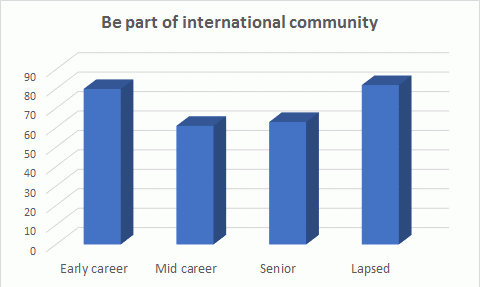Feedback on our membership survey
Intro
As you will know, for the last few months we’ve been conducting a survey into membership of the Royal Society of Tropical Medicine and Hygiene (RSTMH). We asked members, lapsed members and non-members, to tell us what they thought of our current membership programme, and to advise us on any improvements we should make. The survey was started in the summer of 2016, and extended at the end of 2016, to include additional questions relating to our wider strategy review.
Thanks to all of you who completed it, and also who helped to share it with your colleagues and peers, and in your regions. I’m delighted to say we had almost 200 responses by the end of February 2017, and the feedback is incorporated into our new strategy as it is being developed.
I wanted to share with you some highlights of the survey responses, as we move through the process of further developing our new strategy, and also looking more closely at our messaging.
Who took part in the survey?

The survey was completed by a mix of fellows and non-fellows. They were from a range of countries, representing 5 continents, and from the spectrum of career stages, as shown below. We were really pleased with this diversity and grateful to the many people who volunteered to share the survey in their own networks. In particular it’s good that almost a third of respondents have never been members, bringing good insight into the reasons for that, as we’ll see later.
How do respondents see RSTMH?
The respondents told us, with some consistency, how they see RSTMH. The most popular words used to describe us being ‘professional’ and ‘expert’. The descriptions that respondents thought least described us were ‘campaigning’ and ‘stuffy’. For an organisation founded in 1907 we’re pleased not to be seen as stuffy, but rather an organisation that is proud of its long history, and of the expert voice in tropical medicine and international health we have, from our members and our experience.
Why do members join?

Through the survey we learned about the most popular reasons why members decided to join the RSTMH, which included being part of an international community, to access networking opportunities and to develop their professional knowledge. These three reasons were popular across members of all career stages. The example below shows the percentages of respondents at different career stages, who chose being part of an international community as a reason to join RSTMH.
How can we improve membership?
We also heard from respondents about how they think we could improve membership. Ideas included ensuring our Board, committees and meetings are more accessible for members outside of the UK, and also outside of London. They wanted to see more partnerships with other organisations, more diversity in our membership in terms of geography, discipline and sector, as a way of improving the impact we could have. They wanted to see us make more use of social media and digital channels, and to speak out on issues that are important to our collective goals, and work.
How could we better support early career professionals, specifically?

We asked specifically about how we could better support our members who are early career professionals, and how we could improve the value of membership for them, to ensure they remain with us, and their voices are heard through our work. There was great agreement on the views of both current early career members, and more senior members looking back with hindsight at what would have been important in those early career years. Opportunities such as mentoring, more opportunities to publish and present their work, and careers advice were the top three responses, as you can see below.
How can we better help members?
When we asked how we could have helped our members more, they pointed to some clear improvements in our activities. The most popular answer to this, across all stages of career was to help people connect better with their peers. There was also a strong voice calling for better ways to help disseminate research.
Where do we focus our work?
Finally we asked respondents about the forthcoming big challenges for tropical medicine and for international health. We then asked them what thematic areas they felt we should be focusing on, given our size, experience and networks of members and other supporters. In answering this question they were again fairly consistent across stages or career, and membership status. The most frequently chosen themes included drug resistant infections, neglected tropical diseases, malaria, emerging health threats, one health and planetary health. It was clear from the responses that this group feels strongly about us keeping our established ties and expertise in tropical medicine and infectious disease, yet sees a role for us to include non-communicable diseases, and also one health and planetary health considerations.
What happens with the results of this survey?
The results of our survey were combined with the findings of more than 100 interviews with members and non-members, and workshops amongst the team and the Board. This information has been framing the development of our new strategy, some of which has been launched at an event in London, with further events in Liverpool, Brighton and the US being planned over coming months.
The next stage of our review is to revisit some of the ways in which we describe our work, to ensure it is accurate, easy to understand and tailored where needed. If you would like to take part in this second survey you can do so here.
If you would like to talk to us about the new strategy please email me at tamar [dot] ghosh [at] rstmh [dot] org